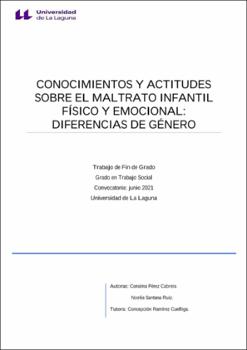Conocimientos y actitudes sobre el maltrato infantil físico y emocional: diferencias de género.
Fecha
2021Resumen
La presente investigación tiene como objetivo descubrir los conocimientos y las actitudes de
los padres y madres ante el maltrato físico y emocional, además de explorar las posibles
diferencias de género en cuanto a las actitudes y conocimientos sobre el maltrato infantil. Para
llevar a cabo la investigación, se envió un cuestionario vía online, a 80 padres y madres, con
edades comprendidas entre 25 y 60 años.
Los resultados obtenidos muestran que los/as participantes, en términos generales, tienen
conocimientos sobre el maltrato infantil. Sin embargo, a la hora de analizar las actitudes y
creencias, se detecta la existencia de diversos comportamientos y actitudes que ponen en alerta
los indicadores del maltrato infantil. Además, tras el análisis obtenido de las 80 muestran, se
puede observar que existen indicios que manifiestan una posible diferencia de roles en el hogar,
suponiendo así, diferentes formas de educar a sus hijos/as.
El análisis de este estudio supone un resultado no concluyente, ya que no permite conocer la
realidad en su totalidad, debido a su reducido número de participantes. Por ello, es necesario la
realización de nuevas investigaciones que incluyan un mayor número de participantes y
muestren una realidad más próxima a los objetivos planteados.
Como conclusión, se considera necesario poner en práctica un protocolo real que permita dotar
a las familias de aquellas capacidades y habilidades parentales, que van a favor del buen
desarrollo y bienestar del/a menor, consiguiendo así prevenir el maltrato infantil. The present research aims to discover the knowledge and attitudes of parents towards physical
and emotional abuse, in addition to exploring possible gender differences in terms of attitudes
and knowledge about child abuse. To carry out the research, an online questionnaire was sent
to 80 fathers and mothers, aged between 25 and 60 years.
The results showed that the participants, in general terms, have knowledge about child abuse.
However, when analyzing attitudes and beliefs, the existence of various behaviors and attitudes
is detected that put the indicators of child abuse on alert. Furthermore, after the analysis
obtained from the forms 80, it can be observed that there are indications that show a possible
difference in roles in the home, thus supposing, different from educating their children.
The analysis of this study assumes an inconclusive result, since it does not allow us to know
the reality in its entirety, due to its small number of participants. For this reason, it is necessary
to carry out new research that includes a greater number of participants and shows a reality that
is closer to the objectives set.
In conclusion, it is considered necessary to put into practice a real protocol that allows to equip
families with those parental capacities and abilities, which are in favor of the good development
and well-being of the minor, thus preventing child abuse.





